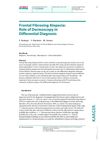
Search
for
Sort by
Research
210-240 / 1000+ results

research Abstracts from the Symposium on the Pathophysiology of Hair Growth Organized by the Institute of Dermatology at the Royal Society of Medicine, 29 October 1987
The symposium concluded that hair growth involves complex processes, including the hair follicle life cycle, the role of the dermal papilla, hair strength, pigmentation, and the impact of diseases and treatments like minoxidil on hair and skin.

research Severe Cutaneous Adverse Reactions to Drugs
Some drugs can cause rare but potentially deadly skin reactions, and early treatment and avoiding the drug again are key.

research Drug-Induced Hair Loss and Hair Growth
Some drugs can cause hair loss or increase hair growth, but these effects are usually reversible when the drug is stopped.

research Histopathologic Evaluation of Alopecias
The document concludes that accurate diagnosis of different types of hair loss requires careful examination of hair and scalp tissue, considering both clinical and microscopic features.

research Biology and Genetics of Hair
The document concludes that understanding the genes and pathways involved in hair growth is crucial for developing treatments for hair diseases.

research Evaluation and Diagnosis of the Hair Loss Patient
To diagnose hair loss, use a systematic approach including history, exams, and tests.

research Effects of the Lexington LaserComb on Hair Regrowth in the C3H/HeJ Mouse Model of Alopecia Areata
The Lexington LaserComb helped regrow hair in mice with a condition similar to human hair loss.

research Drug Discovery for Alopecia: Gone Today, Hair Tomorrow
Topical drugs and near-infrared light therapy show potential for treating alopecia.
research Beyond Expectations: The Role of Keratin Intermediate Filament Proteins in Epidermal Integrity
Keratin proteins are crucial for healthy skin, but mutations can cause skin disorders with no effective treatments yet.

research New Activators and Inhibitors in the Hair Cycle Clock: Targeting Stem Cells’ State of Competence
The conclusion is that Fgf18 and Tgf-ß signaling could be targeted for hair loss treatments.

research Zinc as an Ambivalent but Potent Modulator of Murine Hair Growth In Vivo: Preliminary Observations
Zinc can both inhibit and stimulate mouse hair growth, and might help recover hair after chemotherapy.

research The C3H/HeJ Mouse and DEBR Rat Models for Alopecia Areata: Review of Preclinical Drug Screening Approaches and Results
Both mouse and rat models are effective for testing alopecia areata treatments.

research The Genetics of Hair Shaft Disorders
The article explains the genetic causes and symptoms of various hair disorders and highlights the need for more research to find treatments.

research The Cultural and Philosophical Concepts of Cosmetics in Beauty and Art Through the Medical History of Mankind
Cosmetics enhance beauty, fix defects, and intimidate enemies, with varying cultural standards and alternative methods.

research Common Causes of Hair Loss: Clinical Manifestations, Trichoscopy, and Therapy
The document concludes that understanding and treating hair loss requires recognizing its various types and using appropriate diagnostic tools and treatments.

research Acquired Scalp Alopecia: A Review
Accurate diagnosis is key for treating different kinds of hair loss, and immune response variations may affect the condition and treatment results.

research Role of Trichoscopy in Children's Scalp and Hair Disorders
Trichoscopy is good for diagnosing and monitoring hair and scalp problems in children but needs more research for certain conditions.

research Alopecias in Lupus Erythematosus
Different types of hair loss in lupus need careful diagnosis for proper treatment.

research Objective Outcome Measures: Collecting Meaningful Data on Alopecia Areata
The document suggests using standardized methods to track and measure hair loss in alopecia areata, including patient self-assessment and a 50% improvement in specific scores as a treatment goal.

research A Clinical and Biological Guide for Understanding Chemotherapy-Induced Alopecia and Its Prevention
Scalp cooling can help prevent chemotherapy-induced hair loss with a 50-90% success rate and is safe for patients.

research The Diagnosis and Treatment of Hair and Scalp Diseases
Hair loss requires customized treatments based on its various causes and types.

research Straight Hair Associated with Interferon-Alpha Plus Ribavirin in Hepatitis C Infection
ALA-PDT is effective and safe for chronic X-ray dermatitis, providing complete or partial remission.

research Frontal Fibrosing Alopecia: Role of Dermoscopy in Differential Diagnosis
Dermoscopy helps diagnose frontal fibrosing alopecia by distinguishing it from other hair loss conditions.

research Madarosis
Madarosis is the loss of eyelashes and eyebrows due to various health issues and requires thorough examination to diagnose and treat the underlying cause.

research The Role of Vitamin D in Non-Scarring Alopecia
Low vitamin D might be linked to certain types of hair loss, and supplements could help, but more research is needed.

research Differential Diagnosis of Hair Loss in Children
The document concludes that early diagnosis and treatment are crucial for children with hair loss to prevent permanent damage, although not all conditions can be effectively treated.

research Hair Loss in Children
Most hair loss in children is caused by a few common conditions, and it's important to diagnose these properly and support the child's mental health.

research Trichoscopic Findings in Alopecia Areata and Their Relation to Disease Activity, Severity, and Clinical Subtype in Turkish Patients
Certain scalp patterns can indicate the severity and activity of hair loss in Turkish alopecia patients.

research Thyroid Diseases and Skin Autoimmunity
Thyroid diseases may contribute to autoimmune skin diseases, and more research is needed on their relationship.